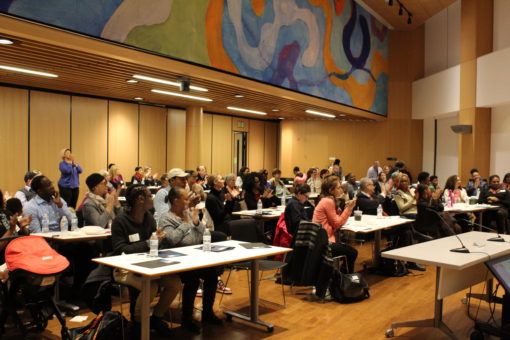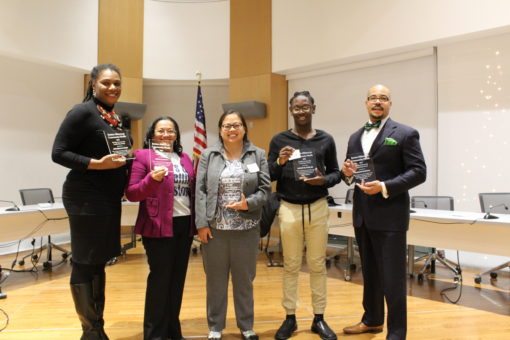Throughout 2016, BACH was able to support over 20 residents in attending trainings.
conferences and other learning opportunities through a modest scholarship program. Locally, residents participated in the Boston Alliance for Race and Equity Summit, ServSafe Program, Greater Boston Women of Color Environmental Health Conference, Technical Strategies to Ensure Participation in multi-lingual Meetings, hosted by Mel King Institute, and Tackling Social Determinants of Health: Critical Skills for the Health Workforce, sponsored by Medical/Legal Partnership-Boston. We were even able to support two resident members in attending the 2016 National Bike Summit & Women’s Forum in Washington, D.C.!
Bette O’Gara who is a resident of Dorchester and attended the “Tackling Social Determinants of Health” Conference, stated the key takeaway was understanding the importance of social and environmental factors that cause poor health. She writes, “Exposure to toxic stress, trauma, physical or emotional abuse, community violence, homelessness can inhibit a person’s ability to engage effectively in work, school, and community activities. We (the provider and consumer communities) need to create risk assessment tools which can help to identify, engage and chart the outcomes persons who need, access and use services to ‘promote good health’ and ‘prevent disease.’”
BACH continued to engage Boston residents through our Community Engagement and Membership Committee monthly workshop series, Passport to Public Health, which concluded in October. The workshops aimed to create a public platform for residents to learn about health inequities and social determinants of health, and provide the opportunity to network, build skills, and strengthen neighborhood cohesion. The series consisted of a total of 10 workshops that addressed a variety of public health issues including: online safety, immigrant rights, home ownership, men’s health, mental health and addiction, domestic violence, race and resilience, active transportation, senior health, and sexual health. We successfully engaged over 250 residents in public health issues through Passport to Public Health!


Our Community Engagement and Membership Planning Committee remains committed to diversifying community partnerships and increasing resident involvement in our efforts to support healthy communities through education, communication, and collaboration, and is working hard to plan our 2017 free public health programming!
Over 100 attendees came out to our Annual Meeting held on December 12th, which was a night of discussion and celebration! At the event our director, David Aronstein, highlighted BACH’s 2016 year and discussed where BACH is headed in 2017. There we also presentations about Boston’s Community Health Improvement Plan Goals based on the MAPP process BACH implemented, and on the findings from Boston hospitals’ Community Health Needs Assessment meetings in neighborhoods, coordinated and hosted by BACH-affiliated coalitions. The Annual Meeting’s keynote speaker, Dr. Jessie Gaeta, Chief Medical Officer for Boston Health Care for the Homeless Program, discussed the issues of homelessness and opioid addiction in Boston and linked patient stories to policies that have hurt or helped them. We also presented our Healthy Community Leadership Awards to highlight and honor Bostonians who are either immigrants, persons of color, or from an underrepresented group, and have taken a leadership role in a community based coalition or organization, to help improve the health of the community and address racial and ethnic health inequities in Boston. This year’s five awardees are: Raheem Baraka, Baraka Community Wellness; Michelle Cook, Roxbury Rides & Let’s Get Healthy, Boston!; Edna de Paula, Healthy Community Champion & Allston-Brighton CDC; Lisa Melara, Healthy Community Champion & Union Capital Boston; and EJ Slater, The Charlestown Coalition.


See more photos from the Annual Meeting, here.
In addition, our new initiative, Ambassadors, will pilot in the neighborhoods of East Boston, Roxbury/Mission Hill, Jamaica Plain, South End and Dorchester in the beginning of 2017. It is designed to raise awareness on public health policy efforts directly affecting neighborhoods, to encourage resident participation in advocacy related to community health, and to connect Boston residents with organizations in their neighborhoods. Our hope is that this program will help in coordinating grassroots advocacy efforts across the city. This first cohort of Ambassadors will decide on specific issues to work on and develop a shared agenda for the next year.
Furthermore, BACH continues to carry out resident engagement through our BachLEARN newsletter and our Learning Community sessions. BachLEARN is our bi-weekly listing of local trainings, webinars, reports and conferences that relate to our five strategic issues that is sent out on the 15th of each month (sign up for our mailing list here!). Our Learning Communities, held quarterly, are an opportunity for our coalitions to come together, share best practices for building capacity, leadership, and access new resources.
BACH continues to view the role of empowering residents to organize and join our efforts vital to making Boston a more equitable place to live, work and play.

